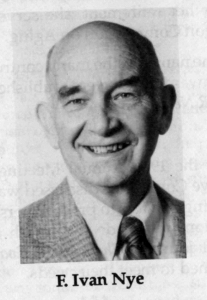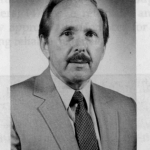Leadership in 1965–1966

Ivan Nye
¶ 1 Leave a comment on paragraph 1 0 Ivan Nye, NCFR’s 23rd President, was Distinguished Professor of Sociology at Florida State University, the University of Nebraska, and Washington State University. Nye was also an outstanding editor of NCFR’s Journal of Marriage and the Family. He currently lives in Mesa, AZ. Much of his research was cutting-edge work in the field of social control theory and juvenile delinquency.
¶ 2 Leave a comment on paragraph 2 0 Here is an excerpt from a biography:
¶ 3 Leave a comment on paragraph 3 0 Nye (1958) not only elaborated a social control theory of delinquency, but specified ways to ‘operationalize’ (measure) control mechanisms and related them to self-reports of delinquent behavior. He formulated the theory, having formally interviewed 780 young people in Washington State, but the sample was criticized because it contained no-one from an urban environment and those selected might be those more willing to describe their families unfavorably. Some were concerned that criminal activity was only mentioned in two of the questions so the extrapolations to crime in general were considered unsafe. Like [Ira] Reiss, he focused on the family as a source of control. Moreover, Nye specified different types of control:
- ¶ 4 Leave a comment on paragraph 4 0
- direct control = punishments and rewards
- indirect control = affectionate identification with non-criminals; and
- internal control = conscience or sense of guilt.
¶ 5 Leave a comment on paragraph 5 0 Youth may be directly controlled through constraints imposed by parents, limiting the opportunity for delinquency, as well as through parental rewards and punishments. However, they may be constrained when free from direct control by their anticipation of parental disapproval (indirect control), or through the development of a conscience, an internal constraint on behavior. The focus on the family as a source of control was in marked contrast to the emphasis on economic circumstances as a source of criminogenic motivation at the time. Although he acknowledged motivational forces by stating that, ‘some delinquent behavior results from a combination of positive learning and weak and ineffective social control’ (1958: 4), he adopted a control-theory position when he proposed that “most delinquent behavior is the result of insufficient social control.”
¶ 6 Leave a comment on paragraph 6 0 The following is an excerpt from Nye‘s Presidential Address:
¶ 7 Leave a comment on paragraph 7 0 If the writer could make one general wish for society of the future, it would be that society could view social structure as instrumental and thus freed from the dead hand of traditional practice, objectively weigh the changes that from time to time need to be made if the family and other institutions are to function more effectively. The emancipation from tradition must depend on societal foresight in anticipating the consequences likely to flow from change and, in the light of such probable consequences, in maintaining those restraints on the short-run desires of individuals which may be required so that the rights of others are taken into account and the necessary and important tasks of society are performed.
Gallery
- Ira Reiss



Comments
0 Comments on the whole Page
Login to leave a comment on the whole Page
0 Comments on paragraph 1
Login to leave a comment on paragraph 1
0 Comments on paragraph 2
Login to leave a comment on paragraph 2
0 Comments on paragraph 3
Login to leave a comment on paragraph 3
0 Comments on paragraph 4
Login to leave a comment on paragraph 4
0 Comments on paragraph 5
Login to leave a comment on paragraph 5
0 Comments on paragraph 6
Login to leave a comment on paragraph 6
0 Comments on paragraph 7
Login to leave a comment on paragraph 7